The earth shaking rumble of the oncoming freight train in my dream was real enough to startle me awake. I sat bolt upright in my tent where I was sleeping quite soundly. It had been a long previous day. My crew and me had switched with the previous range riders in the afternoon, and then rode horseback, herding the cattle until just before dark. It felt as if only a few minutes ago, I was dousing the lantern and falling into my bedroll at a couple of minutes to midnight.
The rumble was real, and I felt like it was coming toward me. My blood pressure immediately rose because I knew immediately what peril it was: stampede! Just seconds ago, over 300 head of cattle lay resting in our hotwire enclosed night pen, just 200 feet from camp, but now they were all in a dead run, outbound. Something had spooked them, and they blew out, flattening their single-wire electric fence, pouring through the hole like the Salmon River at flood stage.
They were on the lam.
I was glad Jake and Rebecca put the 4 sleeping tents up in a highly visible row; otherwise, things could have gotten ugly and some of us may have been trampled by a mass of 1000 pound cattle in our sleep. But the moon was full this night, and the forest we camped in had a luminosity about it, despite the closed canopy that the dark conifers created. The tents were easy to see—and go around, even for a frantic tide of cattle.
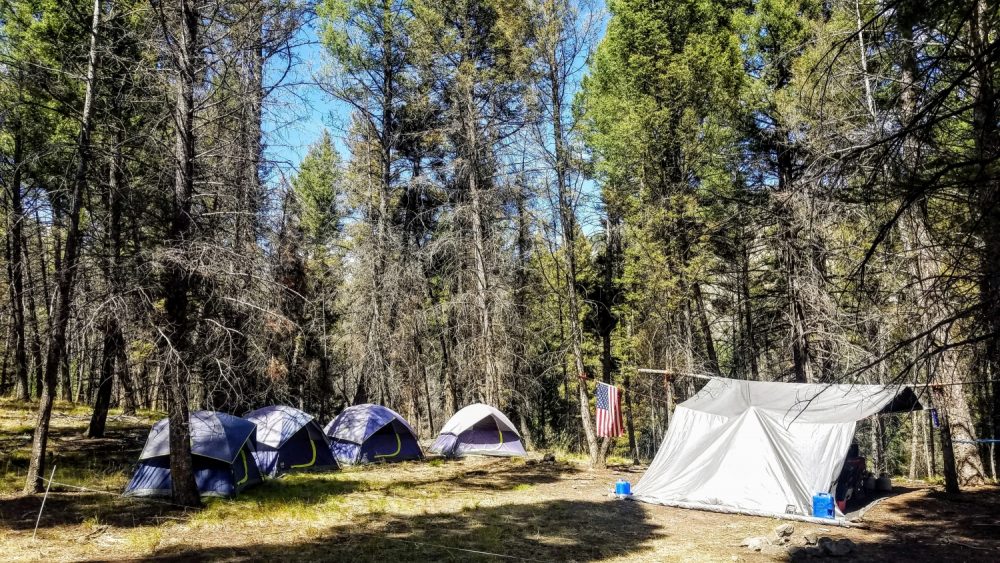
My mind raced through possibilities. Should I go out there? No, said my slowly precipitating thoughts. The cattle were gone, and there was no stopping them. I could hear the herd, the stampede crashing up through the timber on the densely forested mountainside. Occasionally one of them would call out with an alarmed bawl. And slowly, the noise of over one thousand footfalls on the run abated. They had broken the ridge above camp, and settled into the deep green of the Douglas-fir forest understory.
The thick pinegrass and elk sedge, and the verdant color, even in the moonlight, was too much to resist. They began grazing instead of running, and I imagined them fanning out across the broad mountainside in the speckle of moonlight filtering through the pine needles above.
I laid back down. I checked the time: 1:37 AM. No sense in waking daughter Annie and Jake. I don’t know how they slept through it; it felt like an earthquake. We would gather them all tomorrow. Their bellies would fill by midmorning, and they will lay down, as they always do—they shouldn’t be too hard to locate.
Provided they don’t walk 20 miles in the moonlight.
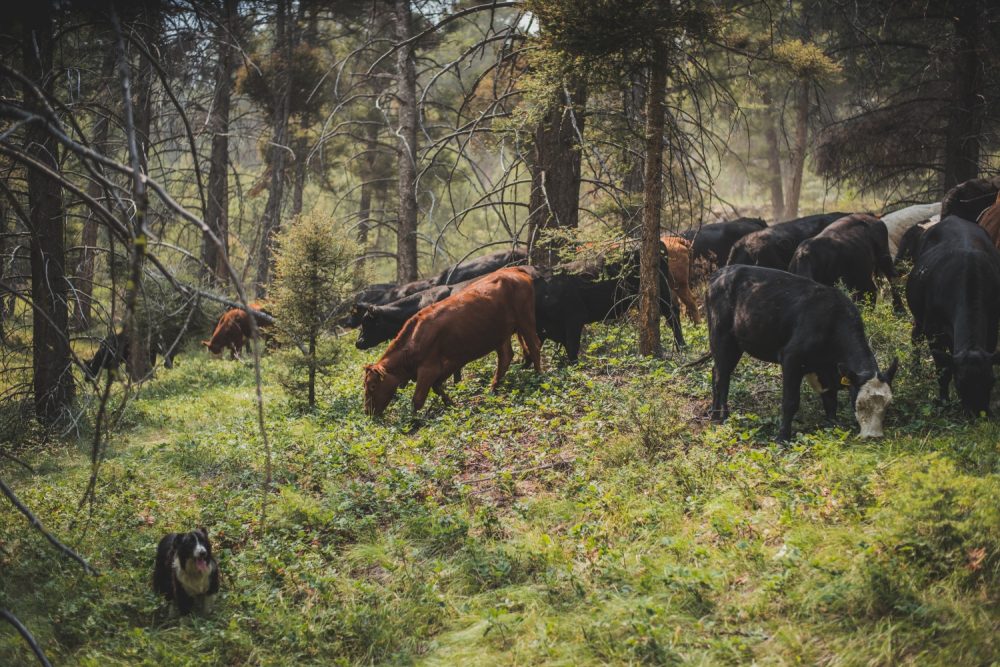
We haven’t been hearing any wolves or cutting any tracks as of late, so the beeves were likely safe as they wandered. I had found some old scat on the hills about a quarter mile behind camp, but nothing recent.
I could hear the horses, whinnying, and pacing, nervous, in their timbered pasture across Iron Mountain Creek. Perhaps they saw what spooked the cattle. A wandering bear, perhaps, walking up the creek? The crew had just seen one a mile away the day before.
With these thoughts I faded off. I heard Annie calling to Clyde, her in-tent border pup companion. Apparently he heard the commotion. But within a few minutes, all was quiet except the long distant and occasional bawl of a steer up on the mountain beyond us, apparently trying to find his companions.
I woke the next morning in the gray light of predawn. The nighthawks were hard at it, whooshing in the air above the timber canopy, and an occasional owl hooted his last notes for the night. Instead of lighting the lantern, I figured I’d bump around in the low light, and started the stove up with a pot of coffee on it.
I peered over at the night pen. Nothing. I could see the horses grazing contentedly across the creek through open patches in the fir forest. At least we had them.
Then, on the hill above camp, from the direction the cattle went, I heard one steer call out, fairly close. In another minute, I heard another, and soon, there were 20 or so coming down into the night pen for a drink at the tank we had put there. It was the only good water on this side of the mountain except for a few springs. But most of the grass up in the timber where they came from was pretty green—they wouldn’t need a drink until the end of the day.
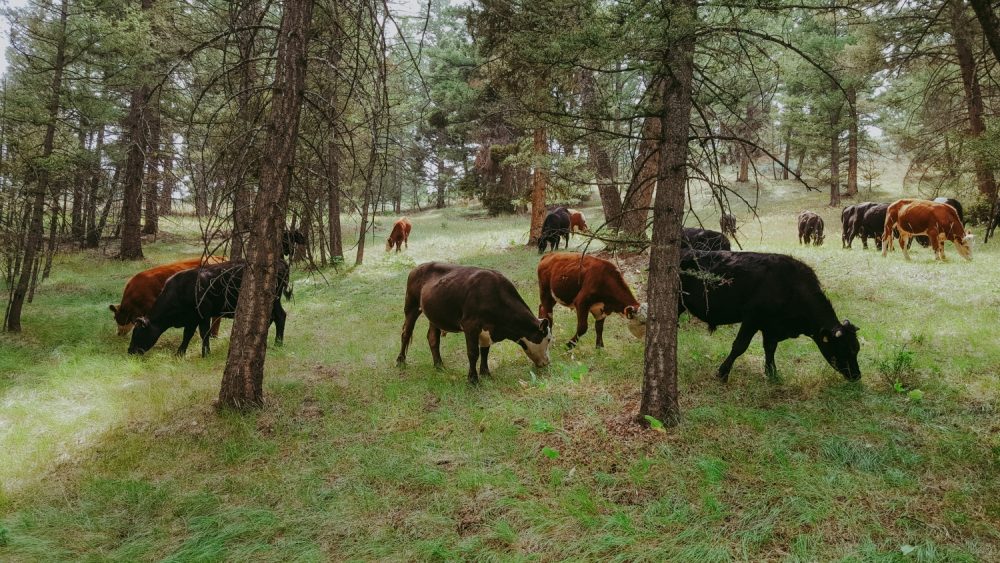
Over breakfast, Annie, Jake and I made a plan.
“Annie, you think you can handle this 20 head or so, and take them back up the mountain through that dark timber?” I looked at her, waiting for an answer. “That way, Jake and I can work the flanks of where you go and keep feeding you cattle as we head up. We’ll look for them in the woods and gather them up, bit by bit.”
My sixteen year old Annie, who has never herded extensively in timber let alone wilderness before, said, “You mean just me? Alone? With all the cattle you send to me?”
“You’ll be fine, and I’m sure you’ll figure it out. Jake and I will check on you whenever we drop some critters off. Just follow the main trail straight up the mountain and we’ll know where to find you.”
You’ll figure it out. Those four words that I often utter have struck terror more than any others on all that have worked for me, including my daughters. It is sad, but quite true. Some have said they’d rather be yelled at than have me say that.
When you come from the Florida or New Jersey suburbs and are stuck on this piece of wilderness in the middle of a patch of bare naked rock backboned geography surrounded by the endless upheaval of the Rocky Mountains in the haunts of wolves, bears and cougars. Or when you have very little practical hands-on experience with anything having to do with route finding for cattle graze or horse gear, and instead have been limited to experience with cell phones, laptops and remote controls, you might say that you can’t just figure it out.
But we hired that young blood because they come with references and interviews that said that they have the grit to can and will, and for the most part they do.
And Annie, well, my Annie comes with the home team advantage. As one of our seven daughters, she’s been having to figure out stuff for a long time, but not in this kind of situation.
And so she just quietly finished up her breakfasting, gulped down the rest of her tea, and went down the single track trail through the woods down to the creek bottom to grab a horse.
Jake watched her get out of earshot and then looked up at me and said: “You know. That Annie—well she’s already got this herding thing down. I’ve been watching her. It must be in her blood.”
“I know,” I said. “She’ll do just fine.”
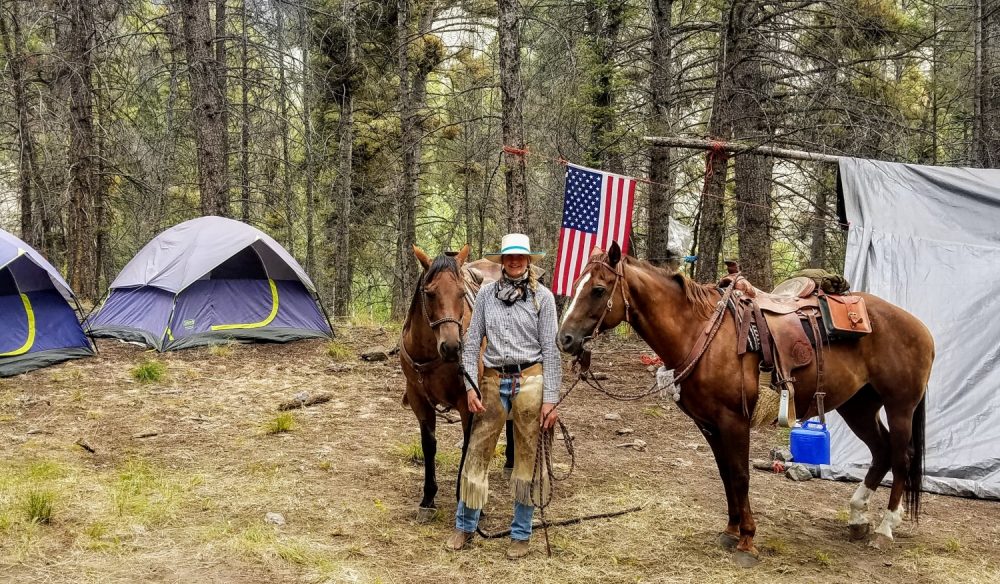
By noon, we had most of the herd mustered. Jake was on the solid Calvin, the older white gelding that had no bottom. He wouldn’t quit.
I was on the young mare Sunny, just started on the range in the past year by Melanie. She had a solid head about her, and was keeping it together despite running herd through down timber, bottomless brush, steep and rocky sidehills and explosive sage grouse launching in flight.
Annie was riding the gritty and a little bitchy Bobby. Sure, she had bucked one of our riders off a few weeks ago, and still had a few issues, but Annie had a good seat, and was pulling it off. The girl was a little stressed when I last checked on her as I dumped three more head of forest wandering steers into her gather. After all, her charges had swollen from 20 to 175 head in her bunch. But she had Clyde, the border pup. He was actually helping maintain her bunch, despite the thick trees and low visibility, and his young age. The little dude was eager and instinctual, even for 10 months old, and had solidly bonded to Annie.
“Where’s Jake?” I asked over the din of the uphill moving mob.
“He’s just over that ridge, I think.”
I looked up, gave a click with my tongue, and Sunny moved out and off to find him.
I made the ridge handily, and trotted down the other side. There were cattle moving ahead, and a plume of black dust was rising high above the treetops. As I broke through the green timber, I found out why.
The entire forested area that the cattle were roaming aimlessly in was burned to a crisp. Some of the soil had become as baked pottery. There was nothing left.
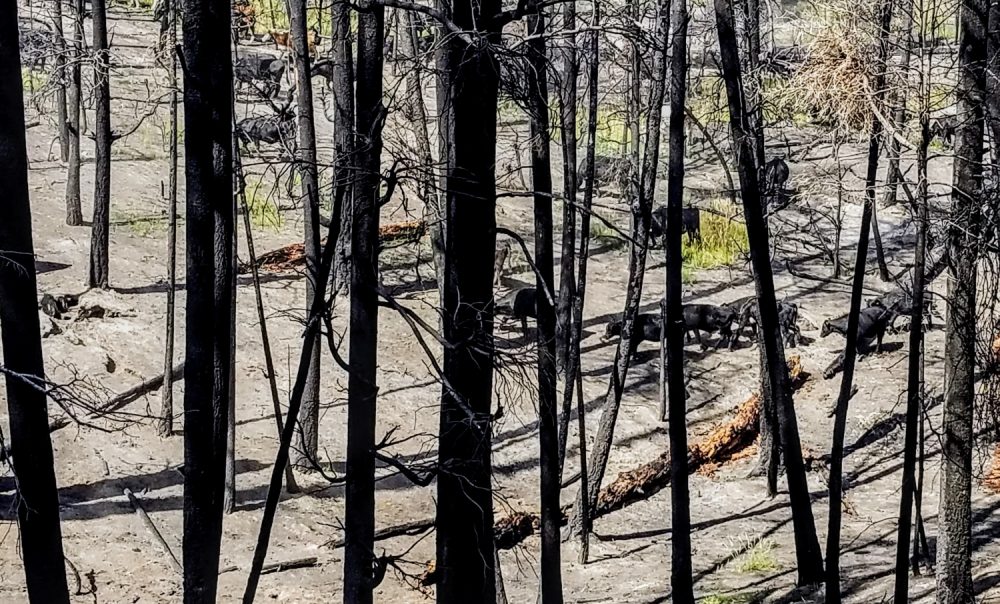
It was the Rabbit Foot fire that passed through our range last year. I had yet not explored all of the fire, as most of it was only accessible on foot over many miles or horseback. Hardly a green thing showed, but the beeves were traveling ever upward, hoping for an end to the black. Skeletal and black trees reached to the sky over a soil surface that was burned to a continuous bed of ash. There was nothing left, except rocks, black and the bones of trees pointing to the sky.
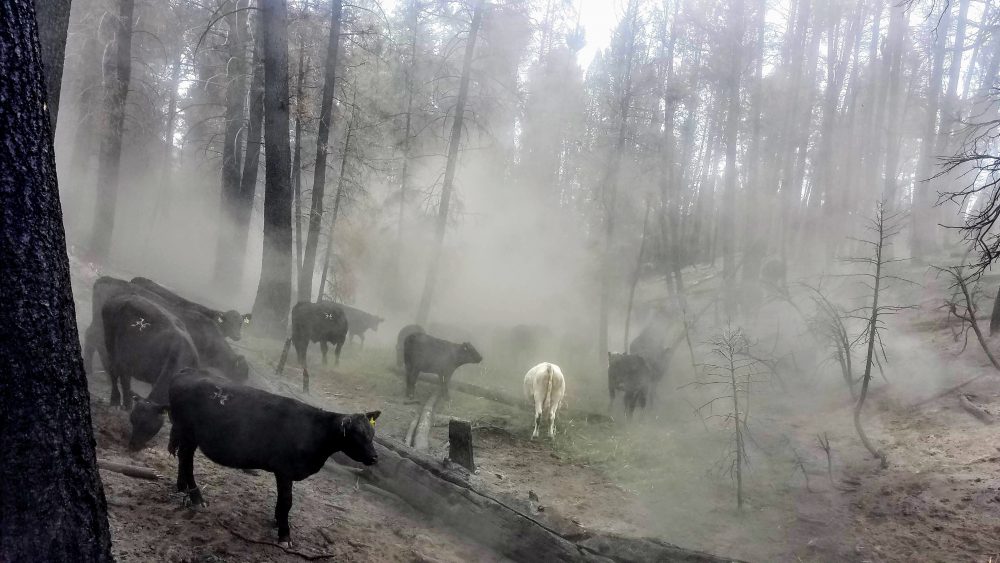
I spotted Jake way across the little valley, and yelled over to him, as he was bringing down about 25 head across the black. “Is there any more up the valley, Jake?”
His distant voice carried clear on the down canyon breeze. “I think there may be. I cut some sign up there by those down logs there by the draw bottom. They pointed uphill, so there may be something up there.”
I think Jake is likely one of my best trackers. He had been tracking game nearly all of his 20 years of life, and practically lived like some kind of feral kid in these Idaho hills. It’s hard to get a tracking and sign instinct into a city kid—it takes a while to teach them to look down instead of out; to feel the motion and sense the signature of what had gone before.
It can be the bend in the grass, or how the caress of the wind handles it. It could be a vague trace of animal scent on the breeze, left behind as they journeyed up a draw. The way scat looks—glossy or matte? A track pointed which way and how? Quarry moving fast or slow—footfalls a long ways apart and directed, or a little aimless as when on the graze?
Jake had learned these things and was quite excited to learn that the cattle had all broke out when he woke up in the morning. “I love nothing more than following sign to find animals. This is going to be a great day!”
Annie flashed me a typical 16-year-old “boys are dumb” look.
Back on the burn, I guided my mare down to the burn area to head up the canyon fork Jake directed me to.
He was right. There were telltale tracks in the burn—going up canyon. I began to follow them across the black when my mare stopped. In her tracks.
I touched my heels to her and clicked. Nothing, as if to say, “no can do, boss.” Everything I tried to cajole her into motion failed. It wasn’t the black; we had been riding across it for several hundred yards. No. It was something more. I thought of that story in the Bible where that guy Balaam is whacking his donkey to move forward when ass was intractably rooted in the trail, only to find out that the donkey could see an awesomely terrible warrior angel in front of him with the big sword whereas Balaam could only see rage directed at donkey through his own eyes.
Well, I wasn’t going to whack my mare. In fact, I just figured we’d go around whatever it was.
So we did, and moved forward again. And then stopped again.
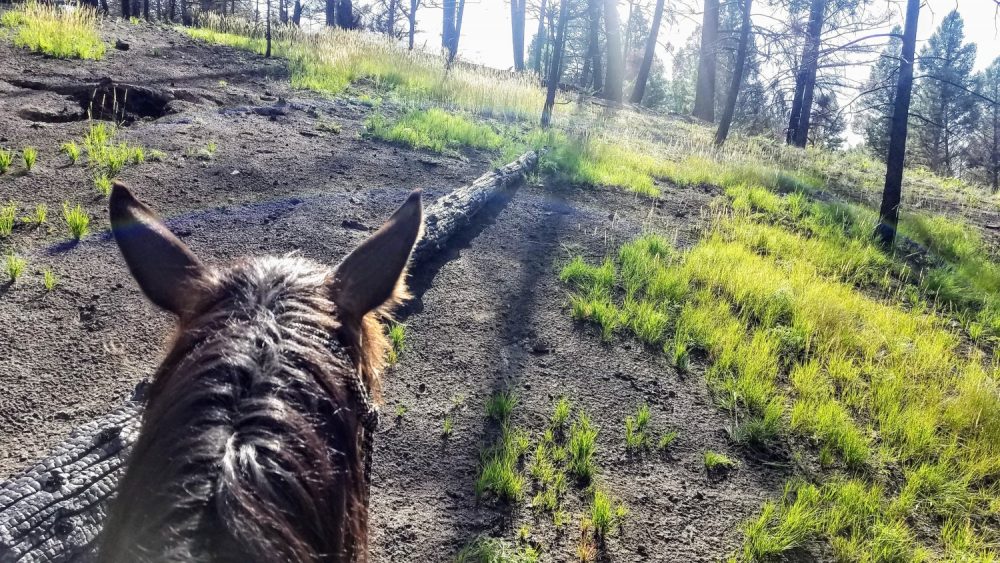
This time, I coaxed her and cajoled her to move cautiously forward.
And in about 4 steps, suddenly, the ground gave way beneath us and we fell.
It was what we used to call (in my firefighting days) a fire hole; it was a trapdoor in the otherwise featureless soil surface where huge tree roots had slowly but quite entirely disappeared through the slow process of underground burning. It took weeks—even months underground, well into the winter sometimes, but all the roots slowly smolder away, and leave a void.
A trapdoor.
We only fell a couple of feet—Jake on his Calvin had gone up to his belly—but nonetheless, it was a life and limb threatening hazard, a kind of mine field.
We easily climbed out of the hole, and from then on, I paid attention to Sunny, who had never been in a burned over timber area, but somehow had the uncanny sense that everything was wrong. Maybe it was something she sensed under her hooves, or maybe she could see something that I couldn’t. But whatever it was, I let her have her head for the rest of the trek out of the burn area.
In the lightly edited words of Obi-Wan: Trust the Horse, Luke.
And so, I did. I spread the word to the others. Jake had observed the same phenomenon. I felt sorry for the poor soul who would beat his or her horse into going on with it.
No. Actually, I felt for the horse, who carried a rider who had no business on a horse’s back.
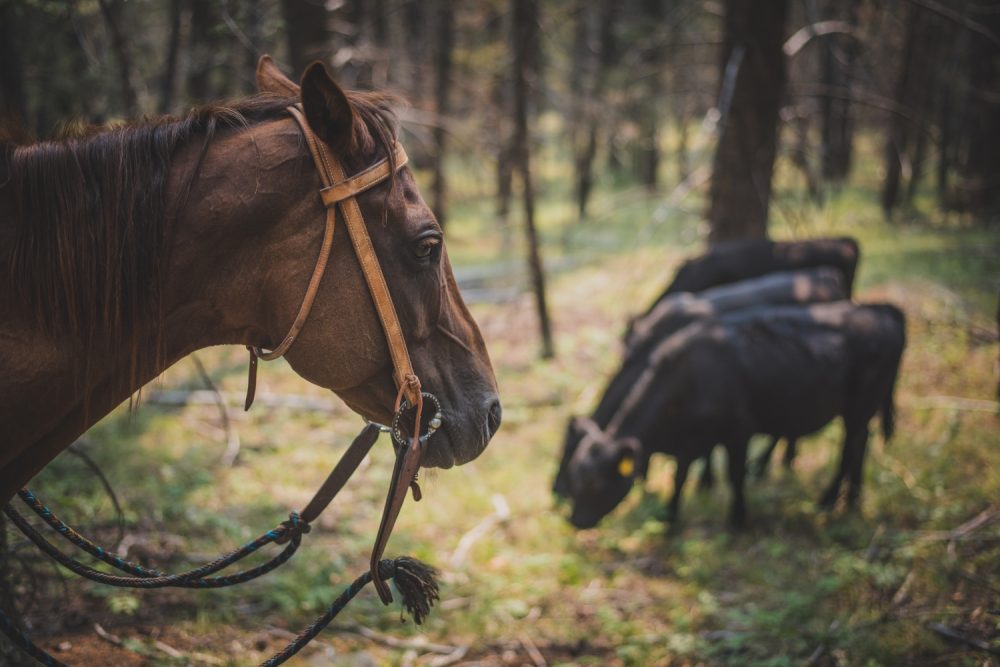
Well, we found all the cattle that day, including the 6 track setters up the long draw Sunny and I headed up. Thankfully, tracker Jake found another missing pod of 66 head in the next canyon, before they beat feet for the distant horizon. The cattle were very content to end that day, as they had grazed until their bellies nearly burst with the goodness found in lightly and patchy burned areas. Because of the nutrients that get released and set in the soil along fire, the grass grew there with wild abandon, and the beeves relished it.
And, they had plenty of time to do it. We figured they’d been grazing from that smorgasbord for nearly 20 hours by the time we made camp and the rebuilt night pen.
And we slept well that night—all was gathered, all were safe, and free from the likes of fire holes.
Except in our dreams. Border pup Clyde rolled all over the floor of Annie’s tent living the day repeatedly. And Annie was too exhausted to care.
Happy Trails.
Glenn, Caryl, Girls and Cowhands at Alderspring





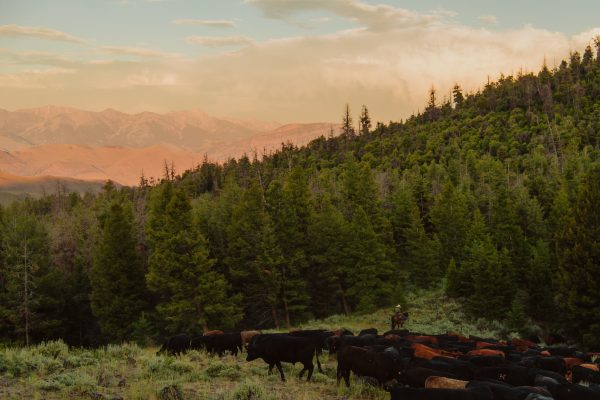

Robin Poupard
Thanks for the perfect visuals of what you go through. I love it!
Caryl Elzinga
Thank- YOU, Robin! Without folks like you, we couldn’t keep doing it!